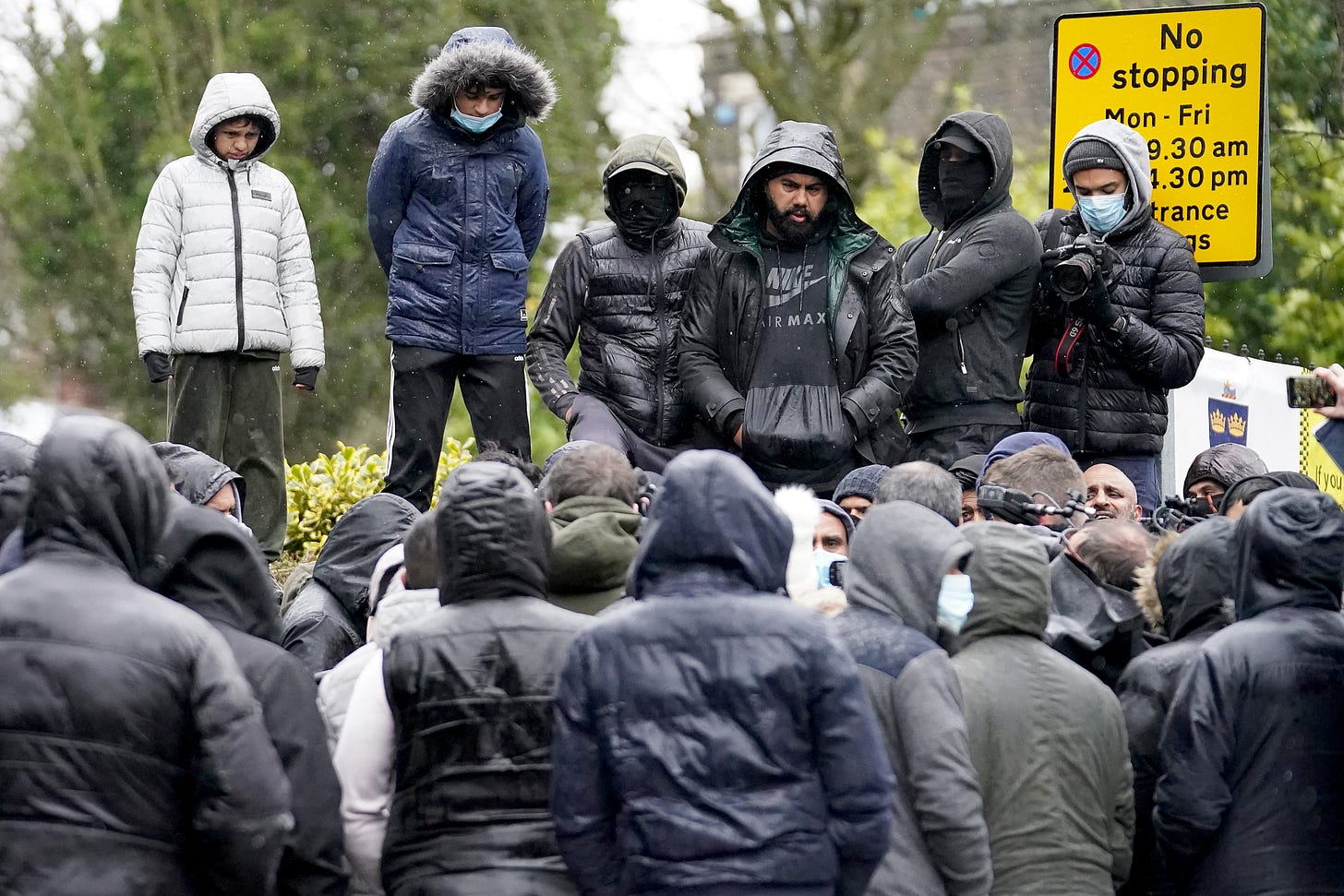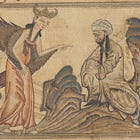We Keep Failing the Blasphemy Test
Recent revelations from the UK show that liberal societies must do much more to stand up to religious intolerance.

It’s the latest version of a story you’ve heard many times before. During a lesson on British values, a teacher at Batley Grammar School in West Yorkshire showed the class a caricature of Muhammad. The image was relevant to the discussion, which was about blasphemy and free speech. The teacher didn’t intend to cause offense. The lesson had already been taught for two years without incident. And none of this mattered—a religious mob descended on the school, administrators offered desperate and cringing apologies, and the teacher fled the community in fear for his life.
In April 2021, at almost the exact same time the Batley teacher was receiving death threats, the UK government appointed human rights activist Sara Khan to conduct a review of “social cohesion and resilience in England.” The Khan Review was finally published last month, and it provides a damning and illuminating account of what happened in West Yorkshire.
After the school sent an apology letter to all parents, dozens of protesters showed up at the school. Then came a barrage of threats. The teacher’s picture was published online, along with his name, address, car, and a photo of his partner. Social media posts declared that “he should be scared for his life” and urged others to “let us know if you know where he is” so they could “sort this out for the Prophet.” The teacher left town with his family. Instead of offering support, the school suspended him, along with other teachers who had used the same lesson materials.
The review found that the teacher felt “incredibly distressed and suicidal” after the episode, and that he now suffers from post-traumatic stress disorder. Even though he was targeted by “threats and harassment [which] included incitement to violence against both him and his family,” local law enforcement determined that he was not the victim of any crime. While those in positions of authority did everything they could to appease the mob, they offered no “clear condemnation” of the threats. The review concludes that the teacher was “let down by all the agencies involved.” Although the incident took place several years ago, the teacher is still in hiding.
It would be difficult to think of a more complete failure to uphold social cohesion and resilience—or the most basic values of a democratic society—than this episode, which raises several uncomfortable questions. How many events like this occur without making the headlines? How much self-censorship is taking place in liberal societies? Who will be the next victim of theocratic persecution in countries that claim to offer robust protections for freedom of expression and conscience?
It’s a bitter irony that classes about liberal values are made all the more important by the reactions they cause—reactions which make it less likely that schools will risk teaching those classes again. One of the most pernicious aspects of self-censorship is that there’s no way to know how much of it is taking place. This is what makes these episodes so insidious—they create an atmosphere of fear and suspicion which coerces the citizens of open societies into silence.
It isn’t difficult to see why the Batley administrators decided that a full capitulation was preferable to taking a stand for academic freedom and liberal values. This was, after all, six months after French history teacher Samuel Paty was beheaded for showing his pupils cartoons of Muhammad during a civics lecture on freedom of expression. Agitators in Batley announced that they were planning to “defend the Prophet.” The specter of violence loomed over the whole affair, and it still haunts the only real victim—the teacher, whose “ability to live in our free society was severely restricted,” as the Khan Report puts it.
But by deferring to these activists, the leaders of the school allowed the most extreme voices to speak for all Muslims. In an open letter, the representatives of Muslim Action Forum purported to speak for the entire “British Muslim community” and announced that depictions of Muhammad “inevitably offend and provoke the feelings of 1.6 billion Muslims on this planet”—ignoring the fact that these activists have no more right to speak for all the world’s Muslims than anyone else.
Beyond appointing themselves spokesmen for every Muslim on earth, the activists accused the teacher of “Islamophobia” and said he was foisting an “extremist white supremacist ideology” on his students. Religious bullies often cloak their authoritarian tactics in progressive language—they claim to be resisting racism and other forms of bigotry. The authors of the open letter claimed to be the ones promoting “social cohesion and harmony” against “extremists” who wanted to stoke racial and religious division.
But these cynical activists know they live in a liberal society which prizes pluralism and tolerance, so they use those values as levers of censorship. Even when there are no calls for violence, allegations of racism and Islamophobia have tremendous coercive power.
This power was on display last year in the United States, when an adjunct professor at Hamline University, Erika López Prater, showed a painting of Muhammad to her art history class. She warned students beforehand and said that anyone who felt uncomfortable could step away. She explained the historical context of the painting. Professors at Hamline and around the country supported her decision to show it.
And she was fired anyway. One professor compared the act of displaying images of Muhammad to using a racial slur. Hamline President Fayneese S. Miller co-signed a statement which declared that Muslim students’ right not to be offended “should have superseded academic freedom.” David Everett, the vice president for “inclusive excellence” at Hamline, sent an email to the entire university which described López Prater’s actions as “undeniably inconsiderate, disrespectful and Islamophobic.”
As in Batley, the Hamline incident demonstrated how legal protections for free speech—and even laws against harassment and violence—are insufficient to uphold the most fundamental liberal values in democratic countries. Because it’s the same story over and over again. When Ayatollah Khomeini called for the murder of Salman Rushdie for writing The Satanic Verses three and a half decades ago, major bookstores refused to stock the novel on their shelves. When a small Danish newspaper published cartoons of Muhammad in 2005 which sparked global riots, many Western publications wouldn’t publish the cartoons. And when Yale University Press later published a book about the controversy, The Cartoons that Shook the World by Jytte Klausen, it chose not to print the cartoons themselves.
Of course, the citizens of Western democracies do occasionally mobilize on a large scale against theocratic censorship. After the Charlie Hebdo massacre in 2015, millions of people took to the streets around the world declaring “Je suis Charlie.” There was an outpouring of support for Rushdie when he was stabbed onstage in New York in August 2022.
But the central lesson of the Batley incident is that theocratic encroachments on free societies are still very much with us. The teacher remains in hiding. Universities and other liberal institutions still routinely submit to religious intimidation—whether the threat of violence or the fear of being smeared as racist or Islamophobic. Rushdie said in his first major TV interview after the attack that one of the gravest threats to free expression today is the presence of “progressive voices saying that certain kinds of speech should be not permitted because it offends against this or that vulnerable group.”
Social cohesion won’t be secured by surrendering liberal principles to whichever illiberal groups yell the loudest. And it certainly won’t be secured by allowing those who use the threat of violence to get their way. The only way to work toward true cohesion is to make it clear to all citizens—no matter what faith they observe or groups they belong to—that certain rights and values are non-negotiable.
This may be the lasting legacy of that anonymous teacher who once taught at Batley Grammar School.
Matt Johnson is an essayist and the author of How Hitchens Can Save the Left: Rediscovering Fearless Liberalism in an Age of Counter-Enlightenment.
Follow Persuasion on X, LinkedIn, and YouTube to keep up with our latest articles, podcasts, and events, as well as updates from excellent writers across our network.
And, to receive pieces like this in your inbox and support our work, subscribe below:




Free speech is vital for democratic and republican societies to thrive. Trying to stop people we disagree with by the use of violence only comes back to haunt us later on when our own views are opposed by others. Every religion known to man has been misused by extreme believers to silence dissent, and the best of political and moral beliefs can be misused as well, with the true believers convincing themselves that their violent acts are on behalf of a greater good.
Wonderful article but you are wrong. Islam is not as powerful and dangerous as much as Judaeo-Christian theology has become feckless, cowardly and otiose. The last theologian who had the courage to oppose Muslim theology was Pope Benedict. God is dead for the Western Intellectual, but Allah is very much alive for the Muslim Intellectual. In the West we confuse God, Religion and Theology. Muslims do not. God and Religion are based entirely on faith. But theology is based on reason. We cannot defeat faith, but we certainly can defeat the bad logic that leads to bad religion that in turn leads to misunderstanding Allah/Hashem/Christ to the point where we forgive Muslims for beheading a school teacher. If the West does not reinvigorate its theologians Islam will indeed wreak havoc on the West. They know their God; we do not understand ours, and the great irony of this is Abraham is the father of all three Western Religions. He had two sons Isaac and Ishmael. Theologically Ishmael, the oldest, is beating the daylights out of Isaac. Let's help the followers of Isaac stand up to his bully of a big brother, Ishmael. Time for the Western theologians to stop cowering and apologizing, and instead start doing Apologetics. Why should Ishmael stop beating up Isaac? I pray the war of theologians will soon eclipse the massacres of the innocents by theologically ignorant "Ishmaelians". God is not illogical, but people are, and deeply so at that.